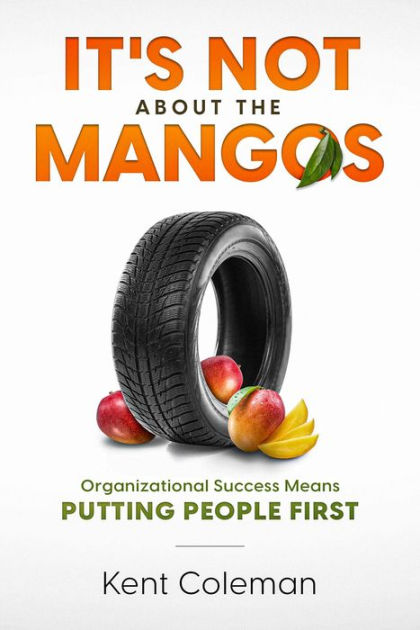I receive books from people all the time, but I felt a personal connection to It’s Not About The Mangos written by Kent Coleman, a tire chain franchisee in Salt Lake City. This book was sent to me from Signarama franchisees Ric and Karen Anderson who are from Salt Lake City as well. Coleman offers many valuable insights relevant to the franchise industry. However, his most significant idea applies to any enterprise: the importance of building relationships and valuing people.
It’s all in the book title, which is inspired by the advice he got from Jose, the top salesman at his tire store. Jose had started his career as the top-selling mango vendor in a local market.
“It’s not about what you’re selling,” Jose told him. “It’s all about people!”
Coleman adopted Jose’s optimistic approach and used it to turn the store into a success. Here are my three top takeaways from the lessons he shares in this book:
Takeaway #1: Positive Energy
Coleman turned to Jose for advice after buying the top revenue producer in a 500-store chain and watching revenue drop 30 percent in his first two years of ownership.
The mangos Jose sold weren’t bigger or better than the competition’s, and they weren’t cheaper. Jose stood out because of the way he treated the people around him. He would ask them about their families and their work, crack jokes and compliment their attire. No wonder people sought him out to buy from. Jose was not just selling mangos; he was building relationships. His customers weren’t just buying mangos; they were buying him.
Jose was what Coleman calls “filled with light,” a positive energy that drew others to him. That, more than experience or technical know-how, is a critical sales skill. Positivity matters at my company United Franchise Group; it starts with the hiring process when we look for people who are optimistic and see the upside rather than the negatives. Negative people don’t last long here.
Takeaway #2: Building Up the Team
On the way to turning around the store with his team’s help, Coleman learned it’s not enough to expect people to find internal satisfaction in their work. “A basic paycheck is not a reward,” he writes. “Rewards should go above and beyond a paycheck . . . If you want to build your team up and help them grow and progress so they can be part of helping the company grow and progress, set up expectations within your organization that exceptional behavior will be rewarded.”
Rewards must be substantial – and public. Instead of rushing on to the next project, take some time to show your appreciation and let your team bask in their success. Let them feel what success is so they can repeat it. Make a big deal of it: Have an awards ceremony, announce it in the company newsletter, hang the successful team member’s picture on a wall everyone passes every day.
Takeaway #3: Embracing Change
Coleman and I are right in sync on this: Success requires the willingness to not just accept change but to embrace it. “That’s the way we’ve always done it” is a dangerous phrase. He quotes railroad executive Alfred Edward Perlman: “After you’ve done a thing the same way for two years, look it over carefully. After five years, look at it with suspicion. And after ten years, throw it away and start all over.”
Coleman believes in questioning everything and being open to the possibility of doing it in a better way. There’s always a better way of doing something, but you’ll never find it if you don’t question it.
The Bottom Line: It’s About People
Coleman bought his franchise with no automotive knowledge or experience and soon learned the importance of having the right team in place. Revenue dropped sharply but eventually came back. He learned about the business in the turnaround, but that’s not what made the difference. It was the people around him who were responsible for the store’s success. That was the biggest lesson for me. Leadership matters, but the people you lead matter more.
Bonus Read: The Ownership Economy: It’s Closer Than You Think
It may seem hard to believe, but one day, our economy will have more owners than employees. Where we might have one company with a single owner and 100 employees today, we will have 100 companies tomorrow. I’ve been watching this phenomenon for some time and decided to nudge it along with my newest book, showing the many possibilities for joining the ownership economy.
Today’s workers are already feeling the need to make their own way; they’re all but forced to, between all the layoffs that are taking away jobs and the rising prices that are taking so much more of their paychecks. The good news is that it’s so much easier to get started in your own company. The internet has simplified the process of building and marketing your own company, reaching customers and fulfilling orders – often without having to touch a single product.
Many businesses are even pre-built for you; franchising is a perfect example. As Coleman notes in recalling how little he knew about the tire business when he bought a tire franchise, experience and knowledge aren’t as important to a franchisee’s success as having a solid team of experts who are motivated to put their knowledge to work for you.
But whether you want to step into a franchise with its own established and tested systems or you’re more the independent sort who prefers not to be part of a larger organization, joining the ownership economy is an opportunity worth investigating.
Ray Titus, 40-year franchising veteran and founder and CEO of United Franchise Group.



